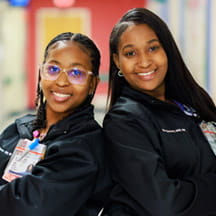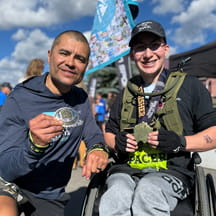At the age of 11, Chanda Chacón was involved in a car accident that left her with a serious back injury. Her parents spent the next two years seeing a series of health care providers in search of relief for their daughter's pain, but never visited a children's hospital. It was an event that shaped her life—personally and professionally.
Today, Chacón, M.P.H., FACHE, is the president and CEO of Children's Hospital & Medical Center in Omaha, Nebraska. Children's Hospitals Today caught up with Chacón to discuss how her personal experiences have molded her approach to health care and how she plans to drive better outcomes for children in her community.
How did your experiences with health care as a child lead to a career spent trying to help children?
My parents were really smart, but they were trying to navigate a complicated health care system. I never visited a children's hospital for my care and rarely saw a pediatric-trained provider. At the very end of that journey, I met a physician who—while he was not pediatric trained—was the first person who actually pulled me into my own care team.
I remember the details of that experience; it plays like a movie in my head. I didn't really know what I wanted to be when I grew up. But knowing how traumatic the entire experience was for my family, I absolutely knew I wanted to do something where I could impact the environment that families experience in health care.
The first time I knew I was destined to be in pediatric health care was when I was interviewing for administrative fellowships. I walked into Texas Children's and it just felt different. I had never been in a children's hospital, and I thought, "Wow, how different would my experience have been for me and my family if I got to be in this kind of place that's trained to take care of kids and their families?' It looked different, it smelled different and it was an entirely different experience than I'd ever had in health care.
That was the moment where I decided that every child deserves access to this—to people who are trained to talk to them differently, care for them differently and help everyone in the family understand what was happening. Basically, to care for them as a family unit and not just a patient.
You often tout a "people first" approach to leadership. Why do you feel that's so integral to success in pediatric health care?
I believe the work we get to do every day creates memories for families.
The work is personal—but it's not just me. I think each one of us who works in health care, and each one of us here at Children's, has a personal story and a personal reason for why they work in pediatrics. That is motivating and creates a level of passion that says, "We can do better, and we can have a bigger impact."
It's very powerful to think that every interaction we have with families crafts those memories—it's just as important as the care they receive. For them to know we care about them is a big deal. And at the heart of it is the idea that it's the people who create those moments. You need to have leaders who are empowered to create amazing programs and buildings, but without great people, a building is just a building. A program doesn't run itself. You must have great people who do that.
As you look out across the landscape of pediatric health care now, what should be among the primary areas of focus for children's hospitals?
The biggest one is social determinants of health—realizing that in pediatric health care the core work of hospitals and clinical care impacts only 10% to 20% of overall children's health. That leaves 80% to 90% up to our ability to partner with organizations that are doing great work and figure out how we can help influence that, support it and build the partnerships to make sure we are moving the dial on children's health.
To me, what determines the future of a state is how healthy its kids are, because at some point they become adults. And if we've done the right work on children's health, we have just empowered a strong future. That is becoming much more apparent in the children's health space because of the adverse childhood events we're seeing and how those impact overall health in the long run. We must be a part of helping to change that. Even though it's not necessarily in the core work we do, it absolutely is part of almost every children's hospital's mission.
Read more about how Chacón's approach to leadership prioritizes the value of team members as individuals to foster a sense of community and improve outcomes.

